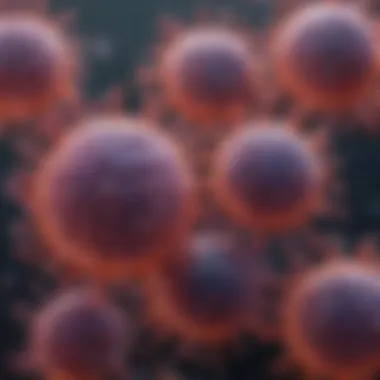Understanding CD19 Cells: Insights and Innovations


Intro
CD19 cells are fundamental components of the immune system, specifically associated with B-cell biology. Understanding these cells involves diving into their biological roles, clinical implications, and future directions in research and therapy. This exploration illuminates the integral function of CD19 in maintaining immune homeostasis and addresses its involvement in various hematological malignancies.
Through recent advancements, particularly in CAR T-cell therapy, CD19 has garnered attention for its therapeutic potential. It is crucial for researchers and healthcare professionals to grasp the nuances that influence CD19 functions, both normal and pathological.
Key Concepts
Definition of the Main Idea
CD19 is a transmembrane protein primarily expressed on B cells. Its role is pivotal in the development and activation of these cells. When engaged, CD19 acts as a co-receptor that amplifies B-cell receptor signaling. Importantly, this signaling is essential for the survival and proliferation of B lymphocytes. Furthermore, because CD19 is uniformly expressed in many B-cell malignancies, it serves as a specific target for immunotherapeutic approaches, such as CAR T-cell therapy.
Overview of Scientific Principles
The biology of CD19 is rooted in its interactions within the immune system. Upon activation of B cells, CD19’s function extends beyond mere signaling; it also influences the subsequent differentiation of B cells into antibody-producing plasma cells.
- Role in Immune Response:
- Enhances B-cell signaling
- Facilitates B-cell maturation
- Contributes to the proliferation of B cells
Understanding these principles is vital for recognizing the therapeutic strategies that target CD19.
Current Research Trends
Recent Studies and Findings
Recent research continues to delve into the multifaceted roles of CD19. For example, studies are examining how CD19 modulation affects treatment outcomes in patients with B-cell malignancies.
Significant trends include the optimization of CAR T-cell therapy protocols that leverage CD19. These advancements demonstrate improved efficacy and reduced toxicities in clinical settings.
Significant Breakthroughs in the Field
One of the notable breakthroughs has been the development of next-generation CAR T-cell therapies. By engineering T cells to express high-affinity anti-CD19 CARs, researchers have made strides in achieving durable remissions in certain leukemias and lymphomas. These findings hold the promise of transforming treatment paradigms in oncology.
Overall, targeting CD19 represents a beacon of hope for numerous patients suffering from B-cell malignancies. Understanding its biology and therapeutic potential is critical for future advancements in immunotherapy.
Overall, targeting CD19 represents a beacon of hope for numerous patients suffering from B-cell malignancies. Understanding its biology and therapeutic potential is critical for future advancements in immunotherapy.
Overview of CD19 Cells
CD19 cells hold a pivotal position in the immune system, particularly in relation to B-cell biology. Understanding their role is essential for grasping the complexities of immune responses and their implications in various diseases. This section provides a detailed overview of CD19 cells, touching upon their significance in both normal physiology and pathological conditions.
Definition and Function
CD19 is a pan-B-cell marker that is present on the surface of B-cells at various stages of development. It functions primarily as a co-receptor, which allows B-cells to recognize antigens more effectively. When an antigen is detected, CD19 amplifies the signals that promote B-cell differentiation and proliferation. This process is crucial for producing antibodies, which are essential for the immune response against pathogens.
Key Functions of CD19:
- Signal amplification: CD19 enhances the signaling pathways initiated upon antigen binding.
- B-cell activation: It plays a vital role in the activation of B-cells during immune responses.
- Developmental marker: It serves as an important marker for distinguishing B-cells during development and maturation.
Discovery and Historical Context
The journey of CD19 discovery began in the 1980s when researchers identified it as a key surface marker on B-cells. Initial studies were aimed at understanding its role in B-cell activation and signaling. The significance of CD19 became apparent as it was linked to various hematological malignancies, including leukemia and lymphoma. While many discoveries have been made, the understanding of CD19 and its functions continues to evolve with ongoing research.
As research progresses, the historical context of CD19 reveals a narrative of discovery, innovation, and expanding clinical relevance.
As research progresses, the historical context of CD19 reveals a narrative of discovery, innovation, and expanding clinical relevance.
The study of CD19 cells provides a foundation for developing targeted therapies and streamlining treatment protocols for certain cancers and autoimmune diseases. By continuously expanding our grasp of CD19's role, we can unlock further therapeutic potential, enhancing the quality of care for patients.


Molecular Characteristics of CD19
The molecular characteristics of CD19 are pivotal in understanding its function and relevance in both normal immune responses and various pathologies. CD19 is a cell surface protein expressed predominantly on B cells, playing a crucial role in B-cell development and activation. Detailed examination of its molecular aspects enables researchers to appreciate not only how CD19 contributes to immune dynamics but also how it can be targeted therapeutically.
Gene Structure and Expression
The gene encoding CD19, located on chromosome 16, is essential for the proper functioning of B cells. This gene has a complex structure that includes multiple exons and regulatory elements that control its transcription. The expression of CD19 is tightly regulated, and its levels can differ at various developmental stages of B cells. This regulation ensures that CD19 is present to help transmit signals during B-cell activation and proliferation.
The transcription of the CD19 gene is influenced by a variety of signaling pathways and transcription factors. For instance, the activation of B-cell receptors leads to upregulation of CD19 expression. Additionally, the expression can be affected by the microenvironment, such as cytokine levels and interactions with other immune cells.
Understanding CD19 gene expression can provide insights into conditions where this regulation goes awry, such as in certain hematological malignancies where CD19 expression may be aberrantly high or low. This knowledge is critical in developing strategies for targeted therapies.
CD19 Protein Structure
The protein product of the CD19 gene is a membrane-bound glycoprotein that consists of an extracellular domain, a single transmembrane domain, and a short cytoplasmic tail. The extracellular domain contains several potential N-linked glycosylation sites, which are important for protein folding and stability. This domain also plays a critical role in mediating the interactions between CD19 and its ligands, which are essential for signaling pathways in B cells.
The cytoplasmic tail of CD19 is less than 100 amino acids long and is key for signal transduction processes. Through its interactions with various signaling molecules, CD19 enhances B-cell receptor signaling, facilitating more effective immune responses. The importance of the protein structure extends to its therapeutic applications. Targeting the CD19 protein in cancer therapies, such as CAR T-cell treatment, illustrates how an understanding of its molecular characteristics can translate directly into clinical practice.
Key Point: The molecular underpinnings of CD19, including its gene structure and protein characteristics, are vital for both its role in the immune system and its therapeutic potential.
Key Point: The molecular underpinnings of CD19, including its gene structure and protein characteristics, are vital for both its role in the immune system and its therapeutic potential.
Understanding these molecular characteristics is essential as it forms the basis for innovative strategies in treating diseases where CD19 is implicated, notably hematological cancers and autoimmune disorders.
Biological Role of CD19 in B-Cells
The biological role of CD19 in B-cells is critical for understanding both normal immune function and the underpinnings of various diseases. CD19 serves as a co-receptor on the surface of B-cells, significantly influencing their development, activation, and overall response to antigens. Its presence is paramount in shaping the immune response and determining the fate of B-cell populations.
B-Cell Development
B-cell development occurs in several stages, starting in the bone marrow and culminating in the peripheral blood. During this process, CD19 plays an essential role in the early stages of B-cell differentiation. Without CD19, pre-B-cells struggle to mature, as this molecule is integral in regulating signaling pathways that govern cell survival and proliferation.
CD19 assists in the transition from pro-B-cells to mature B-cells, ensuring that a diverse repertoire of B-cell receptors is generated. This repertoire is crucial as it allows the immune system to recognize a wide array of pathogens. The expression of CD19 on B-cells not only facilitates this maturation process but also marks these cells for future interactions with antigen-presenting cells.
- Key Points of B-cell Development Related to CD19:
- Supports survival signals necessary for pre-B-cell maturation.
- Assists in the generation of a diverse antibody repertoire.
- Facilitates peripheral B-cell responses in the immune system.
Activation and Signal Transduction
Once B-cells have matured, they require activation to respond effectively to pathogens. CD19 plays a pivotal role in this activation phase. When B-cells encounter an antigen, the binding of this antigen to the B-cell receptor (BCR) initiates a cascade of intracellular signaling pathways. CD19 enhances the signaling efficiency of BCR, leading to better activation and survival of B-cells.
A significant feature of CD19 is its ability to lower the activation threshold for B-cells. This means that even a weak antigen signal can trigger a robust immune response due to CD19’s capacity to amplify signaling. Upon activation, B-cells can undergo clonal expansion and differentiate into plasma cells, which produce antibodies, or memory B-cells, which provide long-term immunity.
- Key Elements of CD19 in Activation:
- Enhances signaling through BCR.
- Lowers the activation threshold, leading to quicker immune responses.
- Promotes differentiation into effector and memory cells.
In summary, the role of CD19 in B-cell biology is both profound and multifaceted, influencing everything from development to activation. A comprehensive understanding of CD19’s functions not only is significant for basic immunology but also has various clinical implications, particularly in the context of immunotherapy.
In summary, the role of CD19 in B-cell biology is both profound and multifaceted, influencing everything from development to activation. A comprehensive understanding of CD19’s functions not only is significant for basic immunology but also has various clinical implications, particularly in the context of immunotherapy.
Clinical Relevance of CD19 Cells
The clinical relevance of CD19 cells encompasses a variety of applications in medicine, particularly in understanding and treating diseases that affect the immune system. CD19 serves not only as a marker for B-cells but also plays a key role in various pathological conditions. Its significance in both hematological malignancies and autoimmune disorders highlights the necessity of targeted therapies and proper diagnostic tools.
Role in Hematological Malignancies
CD19 is primarily associated with B-cell neoplasms. In conditions such as acute lymphoblastic leukemia (ALL) and certain types of non-Hodgkin lymphoma (NHL), CD19 expression defines the malignant B-cells. This expression acts as a therapeutic target in immunotherapies, especially CAR T-cell therapy. This innovative approach involves engineering a patient's T-cells to express a receptor that recognizes CD19, thereby enhancing the immune system's ability to attack cancerous cells.


Recent studies underscore the effectiveness of this strategy in achieving remission in patients who have not responded to traditional therapies. The high specificity of CAR T-cells for CD19 means reduced damage to normal cells, distinguishing it from conventional chemotherapy.
- Key advantages of targeting CD19 in hematological malignancies include:
- High efficacy in eradicating cancer cells.
- Personalized treatment options enhancing patient outcomes.
- Ongoing clinical trials revealing new insights into long-term efficacy and safety.
Furthermore, the identification of CD19 in various leukemias and lymphomas aids in diagnostic procedures and patient monitoring. This reinforces the role of CD19 not only as a therapeutic target but also as an important biomarker in healthcare practices.
CD19 in Autoimmune Disorders
The involvement of CD19 in autoimmune disorders is a growing area of interest. Conditions such as systemic lupus erythematosus (SLE) and rheumatoid arthritis (RA) demonstrate altered B-cell responses, often linked to CD19 levels. Elevated CD19 expression is often observed in the B-cells of patients with these diseases, contributing to the hyperactivity of the immune response.
Novel strategies targeting CD19 have emerged as potential therapies for these autoimmune disorders. By downregulating the function of CD19, it may be possible to normalize aberrant B-cell activity, thus reducing autoantibody production and inflammation.
- Considerations for CD19 targeting in autoimmunity include:
- Need for careful patient selection to avoid excessive immunosuppression.
- Potential for CD19 modulation to improve disease management.
- Ongoing research to understand the precise roles of CD19 in diverse immune contexts.
In summary, the clinical relevance of CD19 extends into both hematological malignancies and autoimmune disorders. Understanding CD19's multifaceted role enables advancements in treatment strategies while simultaneously enhancing diagnostic precision. This knowledge is paramount as researchers and clinicians strive to optimize patient care in immunology and oncology.
"The path towards targeted therapies reveals the indispensable role of CD19, marking a significant breakthrough in both cancer treatment and autoimmune disease management."
"The path towards targeted therapies reveals the indispensable role of CD19, marking a significant breakthrough in both cancer treatment and autoimmune disease management."
By exploring CD19 cells within these contexts, we illuminate the many possibilities for improved health outcomes across a spectrum of diseases.
Therapeutic Applications Targeting CD19
Therapeutic applications that target CD19 are pivotal in the evolving landscape of immunotherapy. CD19 plays a central role in B-cell development and function, making it an attractive target for treating various hematological malignancies. The ability to selectively engage CD19-positive cells has opened new avenues in cancer treatment, particularly in B-cell lymphoma and leukemia. This section explores key therapeutic strategies focusing on CD19, including their mechanisms, benefits, and the inherent considerations in deploying these approaches.
CAR T-cell Therapy
Chimeric Antigen Receptor (CAR) T-cell therapy has emerged as a groundbreaking treatment modality for CD19-expressing tumors. This therapy involves modifying a patient’s T-cells to express a receptor that specifically targets CD19. The engineered T-cells are then re-infused into the patient’s circulatory system. This approach enables the immune system to recognize and eliminate malignant B-cells effectively.
Key elements of CAR T-cell therapy:
- Mechanism of Action: Once infused, CAR T-cells identify and bind to CD19 on tumor cells, triggering cytotoxic responses that lead to tumor cell lysis.
- Clinical Efficacy: Numerous studies have demonstrated high rates of remission in patients with relapsed or refractory B-cell malignancies, including acute lymphoblastic leukemia.
- Safety Considerations: While CAR T-cell therapy shows promise, it is not without risks. Patients may experience cytokine release syndrome, neurotoxicity, or prolonged immunosuppression.
Despite these challenges, ongoing clinical trials are refining the methodologies and aiming to enhance the safety profile of CAR T-cell therapy, broadening its applicability.
Monoclonal Antibodies
Monoclonal antibodies targeting CD19 are another integral aspect of therapeutic strategies against B-cell malignancies. These antibodies can bind specifically to CD19, marking malignant cells for destruction by the immune system.
Advantages of monoclonal antibodies in CD19 targeting:
- Direct Mechanism: Monoclonal antibodies such as Rituximab and Inotuzumab ozogamicin work by directly inducing apoptosis in target cells or facilitating immune-mediated cytotoxicity.
- Combination Strategies: The flexibility of monoclonal antibodies allows them to be combined with other treatments, enhancing overall treatment efficacy and providing synergistic effects.
- Reduced Toxicity: Compared to traditional chemotherapies, monoclonal antibodies often present a more favorable safety profile, enabling better tolerability among patients.
Nonetheless, resistance mechanisms are a significant concern that can diminish the effectiveness of monoclonal antibodies. Continuous research is focused on understanding these mechanisms to enhance treatment regimens further.
"CD19-targeted therapies exemplify the innovative approaches in modern oncology, providing hope for many patients facing dire diagnoses."
"CD19-targeted therapies exemplify the innovative approaches in modern oncology, providing hope for many patients facing dire diagnoses."
In summary, targeting CD19 through CAR T-cell therapy and monoclonal antibodies represents a significant step forward in the fight against B-cell malignancies. As research continues, these therapies will likely improve, leading to better patient outcomes and broader applications in other diseases.
Challenges in CD19 Targeting
The targeting of CD19 cells has become a focal point in therapeutic strategies, particularly in the treatment of B-cell malignancies. However, there are several challenges that impede effective targeting. Understanding these obstacles is crucial for the development of more effective therapies. The primary issues lie in tumor heterogeneity and resistance mechanisms that cancer cells develop over time.


Tumor Heterogeneity
Tumor heterogeneity refers to the existence of diverse cell populations within a single tumor. This variation poses significant challenges for targeting CD19 cells.
- Intratumoral Diversity: Different subclones of cells may express varying levels of CD19. Some may also lose CD19 expression entirely, rendering some therapies inefficient.
- Microenvironment Influence: The tumor microenvironment can affect how CD19 is expressed and how B-cells interact with other immune cells. This can lead to differential responses to treatment among patients.
Cancer cells often adapt, which shows the importance of understanding each patient's unique tumor profile.
"Heterogeneity within tumors necessitates a personalized approach for effective CD19 targeting therapies."
"Heterogeneity within tumors necessitates a personalized approach for effective CD19 targeting therapies."
Resistance Mechanisms
Many patients initially respond well to CD19-targeting therapies such as CAR T-cell therapy. However, resistance mechanisms can develop, resulting in treatment failure.
- Antigen Loss: One of the most notable mechanisms is the loss of CD19 expression on tumor cells. This can happen through mutations or alternative splicing, leading to a lack of target for therapies.
- Altered Signaling Pathways: Cancer cells may activate compensatory signaling pathways that allow them to survive despite the use of CD19-targeting therapies. This can create a situation where the therapy has no effect.
- Immune Evasion: Tumors can develop methods to evade the immune system, such as upregulating checkpoint proteins that inhibit T-cell activation, diminishing the effectiveness of immunotherapy.
Addressing these resistance mechanisms is critical for enhancing the efficacy of current and future CD19-targeted therapies in diverse patient populations.
Future Directions in CD19 Research
The field of CD19 research is evolving rapidly, particularly with advancements in genomics and immunotherapy. Understanding future directions can significantly impact treatments for various diseases. The emphasis on new therapies and personalized medicine approaches highlights why this area is fundamental for both patients and researchers.
Emerging Therapies
New therapies targeting CD19 are on the horizon, evolving from traditional approaches to innovative techniques. One significant trend is the development of bispecific antibodies. These agents can simultaneously bind to CD19 on B-cells and another target, enhancing efficacy. Research indicates that bispecifics may provide better outcomes compared to monotherapy.
Additionally, T-cell engagers are garnering attention. These therapeutic agents harness the body's immune response specifically against CD19-positive cells. Targeting CD19 this way aims to reduce off-target effects commonly seen in conventional therapies. The safety profile and effectiveness of these treatments must be evaluated in clinical trials to ensure their benefit in hematological malignancies.
Furthermore, the exploration of small-molecule inhibitors that target CD19 signaling pathways could offer novel treatment modalities. These compounds are designed to disrupt the function of CD19, potentially leading to improved responses in resistant forms of cancer. Continuous research and clinical testing will play vital roles in determining their viability in patient care.
Personalized Medicine Approaches
With the promise of personalized medicine, CD19 research is poised to capitalize on genetic profiling and biomanufacturing techniques. The focus on tailoring therapies based on genetic background or tumor characteristics can provide profound patient-specific benefits.
For instance, CAR T-cell therapies are being personalized. Researchers now aim to determine the best genetic modification techniques that enhance T-cell activity against specific tumor profiles. This individualized approach could mitigate the risks of treatment resistance.
As more data becomes available, understanding the biomarkers associated with CD19 expression will become crucial. Identifying these markers allows for a more precise selection of patients who will benefit from CD19-directed therapies.
Furthermore, integrating artificial intelligence in drug discovery is an emerging trend. AI can analyze vast datasets to predict patient responses to CD19-targeted therapies. This can lead to more successful treatment plans and improve patient outcomes significantly.
Research into CD19 cells is not only about understanding how they work but also about harnessing this knowledge to advance treatment options for various diseases.
Research into CD19 cells is not only about understanding how they work but also about harnessing this knowledge to advance treatment options for various diseases.
The End
The conclusion serves as a vital segment in this article, summarizing the significant insights regarding CD19 cells. CD19 plays a fundamental role in B-cell biology, influencing both normal immune responses and pathological conditions. The exploration of CD19 has revealed its relevance in hematological malignancies, where it serves as a critical marker for targeted therapies.
Summary of Key Findings
Throughout this article, several key points emerge:
- CD19 is crucial for B-cell development and function, acting as a co-receptor in the immune signaling pathway.
- Its involvement in hematological malignancies like B-cell leukemias and lymphomas highlights its potential as a target for immunotherapy.
- CAR T-cell therapies and monoclonal antibodies have shown promising results in utilizing CD19 as a therapeutic target.
- Challenges such as tumor heterogeneity and drug resistance continue to complicate treatment outcomes.
These findings encapsulate the essence of CD19's biological and clinical significance.
Implications for Future Research
Future research in the field should focus on several areas to enhance our understanding and application of CD19 targeting therapies:
- Investigating new protocols for CAR T-cell therapy to improve efficacy and minimize side effects.
- Exploring the role of CD19 in autoimmune disorders to unlock potential treatment avenues for affected patients.
- Developing personalized medicine approaches, utilizing genetic profiling to better predict responses to CD19-targeted therapies.
By addressing these research gaps, we can further augment our comprehension of CD19 cells, which might lead to enhanced patient care and innovative treatment strategies in immunology and oncology.







